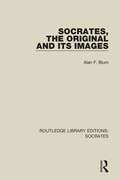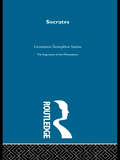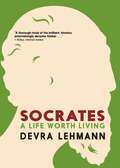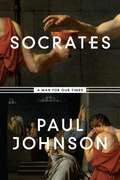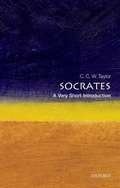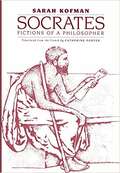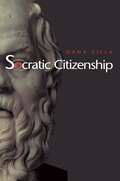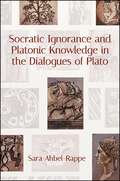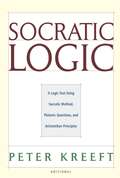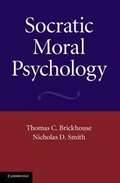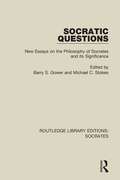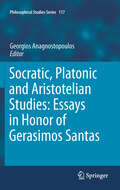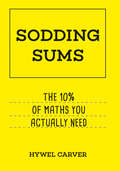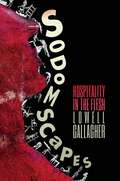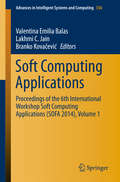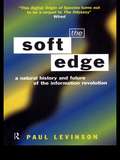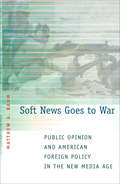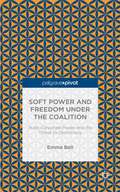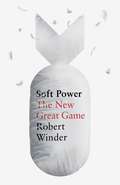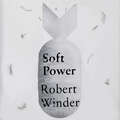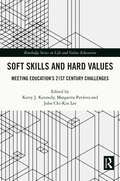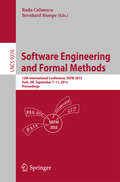- Table View
- List View
Socrates, The Original and its Images (Routledge Library Editions: Socrates #4)
by Alan F. BlumThis book, first published in 1978, is a radical approach to the philosophical distinction between Being and beings, in which the life of Socrates is used as the metaphor for the theoretical life, in contrast to the continuous historical interest in that life as an object for biographical reconstruction and description. Professor Blum’s main concern is to develop a story that coordinates stages of the theoretical life to practices which exemplify man’s ideal relationship with language.
Socrates-Arg Philosophers (Arguments Of The Philosophers Ser.)
by Gerasimos Xenophon SantasFirst Published in 1999. Routledge is an imprint of Taylor & Francis, an informa company.
Socrates: A Life Worth Living (Philosophy for Young People)
by Devra LehmannA lively and accessible introduction to the quintessential philosopher, and the civilized world&’s first enemy of the state. Socrates: A Life Worth Living traces the life and ideas of one of Western Civilization&’s founding philosophers, whose influence is still felt more than two thousand years later. Socrates is famous for how he died, executed by the Athenian government for corrupting the youth of Athens, but his most important contribution was to challenge the people around him to test their ideas and beliefs in conversation with each other, in the belief that in this way we could become a society that knows the difference between truth and falsehood, and find what makes a life worthwhile. He did not claim to have definitive answers, but he knew that knowledge was the key to finding them, and he invited everyone he met to join him in his quest. The Socratic Method is the first, and still the best, method for distinguishing truth from falsehood. In Socrates: A Life Worth Living, award-winning author Devra Lehmann gives us the first biography for young readers of the thinker who has seen no equal.
Socrates: A Man for Our Times
by Paul Johnson"Spectacular . . . A delight to read." --The Wall Street Journal From bestselling biographer and historian Paul Johnson, a brilliant portrait of Socrates, the founding father of philosophy In his highly acclaimed style, historian Paul Johnson masterfully disentangles centuries of scarce sources to offer a riveting account of Socrates, who is often hailed as the most important thinker of all time. Johnson provides a compelling picture of Athens in the fifth century BCE, and of the people Socrates reciprocally delighted in, as well as many enlightening and intimate analyses of specific aspects of his personality. Enchantingly portraying "the sheer power of Socrates's mind, and its unique combination of steel, subtlety, and frivolity," Paul Johnson captures the vast and intriguing life of a man who did nothing less than supply the basic apparatus of the human mind.
Socrates: A Very Short Introduction
by Christopher TaylorSocrates has a unique position in the history of philosophy. On the one hand he is one of the most influential of all philosophers, and on the other one of the most elusive and least known. Further, his historical influence is not itself independent of his elusiveness.
Socrates: Fictions of a Philosopher
by Sarah Kofman<p>Socrates is an elusive figure, Sarah Kofman asserts, and he is necessarily so since he did not write or directly state his beliefs. "With Socrates," she writes in her introduction, "we will never leave fiction behind." Kofman suggests that Socrates's avowal of ignorance was meant to be ironic. Later philosophers who interpreted his text invariably resisted the profoundly ironic character of his way of life and diverged widely in their interpretations of him. Kofman focuses especially on the views of Plato, Hegel, Kierkegaard, and Nietzsche. <p>The information that is available about Socrates's life is paradoxical. He was famously ugly, but he was also a notorious seducer of youth. His sexuality is ambiguous, according to Kofman, for his allure is stereotypically feminine. His death is also subject to varied interpretation. Some commentators regard him as a redemptive, proto-Christ figure, more Jewish than Greek, and others see him as an archetypal Stoic hero. Despite radically different interpretations, Plato, Hegel, Kierkegaard, and Nietzsche all found Socrates to be a dominant figure of immense importance in the history of philosophy. Kierkegaard and Nietzsche try to retain the idea of irony as essential to the Socratic way of life. Hegel, in contrast, insists that Socrates be assigned one particular place in the historical development of Absolute Spirit. While Kierkegaard considered Socratic irony as an intellectual position, Nietzsche recognized and resisted Socrates's irony as a predisposition. In examining each philospher's response to Socratic irony, Kofman draws specifically on the history of philosophy and psychoanalytic theory.</p>
Socratic Citizenship
by Dana VillaMany critics bemoan the lack of civic engagement in America. Tocqueville's ''nation of joiners'' seems to have become a nation of alienated individuals, disinclined to fulfill the obligations of citizenship or the responsibilities of self-government. In response, the critics urge community involvement and renewed education in the civic virtues. But what kind of civic engagement do we want, and what sort of citizenship should we encourage? In Socratic Citizenship, Dana Villa takes issue with those who would reduce citizenship to community involvement or to political participation for its own sake. He argues that we need to place more value on a form of conscientious, moderately alienated citizenship invented by Socrates, one that is critical in orientation and dissident in practice. Taking Plato's Apology of Socrates as his starting point, Villa argues that Socrates was the first to show, in his words and deeds, how moral and intellectual integrity can go hand in hand, and how they can constitute importantly civic--and not just philosophical or moral--virtues. More specifically, Socrates urged that good citizens should value this sort of integrity more highly than such apparent virtues as patriotism, political participation, piety, and unwavering obedience to the law. Yet Socrates' radical redefinition of citizenship has had relatively little influence on Western political thought. Villa considers how the Socratic idea of the thinking citizen is treated by five of the most influential political thinkers of the past two centuries--John Stuart Mill, Friedrich Nietzsche, Max Weber, Hannah Arendt, and Leo Strauss. In doing so, he not only deepens our understanding of these thinkers' work and of modern ideas of citizenship, he also shows how the fragile Socratic idea of citizenship has been lost through a persistent devaluation of independent thought and action in public life. Engaging current debates among political and social theorists, this insightful book shows how we must reconceive the idea of good citizenship if we are to begin to address the shaky fundamentals of civic culture in America today.
Socratic Ignorance and Platonic Knowledge in the Dialogues of Plato (SUNY series in Western Esoteric Traditions)
by Sara Ahbel-RappeIn this highly original and provocative book, Sara Ahbel-Rappe argues that the Platonic dialogues contain an esoteric Socrates who signifies a profound commitment to self-knowledge and whose appearances in the dialogues are meant to foster the practice of self-inquiry. According to Ahbel-Rappe, the elenchus, or inner examination, and the thesis that virtue is knowledge, are tools for a contemplative practice that teaches us how to investigate the mind and its objects directly. In other words, the Socratic persona of the dialogues represents wisdom, which is distinct from and serves as the larger space in which Platonic knowledge—ethics, epistemology, and metaphysics—is constructed. Ahbel-Rappe offers complete readings of the Apology, Charmides, Alcibiades I, Euthyphro, Lysis, Phaedrus, Theaetetus, and Parmenides, as well as parts of the Republic. Her interpretation challenges two common approaches to the figure of Socrates: the thesis that the dialogues represent an "early" Plato who later disavows his reliance on Socratic wisdom, and the thesis that Socratic ethics can best be expressed by the construct of eudaimonism or egoism.
Socratic Logic: Socratic Method Platonic Questions
by Peter Kreeft Trent DoughertyThis new and revised edition of Peter Kreeft's Socratic Logic is updated, adding new exercises and more complete examples, all with Kreeft's characteristic clarity and wit. Since its introduction in the spring of 2004, Socratic Logic has proven to be a different type of logic text: <P><P> (1) This is the only complete system of classical Aristotelian logic in print. The "old logic" is still the natural logic of the four language arts (reading, writing, speaking, and listening). Symbolic, or "mathematical," logic is not for the humanities. (How often have you heard someone argue in symbolic logic?) <P><P> (2) This book is simple and user-friendly. It is highly interactive, with a plethora of exercises and a light, engaging style. <P><P> (3) It is practical. It is designed for do-it-yourselfers as well as classrooms. It emphasizes topics in proportion to probable student use: e.g., interpreting ordinary language, not only analyzing but also constructing effective arguments, smoking out hidden assumptions, making "argument maps," and using Socratic method in various circumstances. <P><P> (4) It is philosophical. Its exercises expose students to many classical quotations, and additional chapters introduce philosophical issues in a Socratic manner and from a commonsense, realistic point of view. It prepares students for reading Great Books rather than Dick and Jane, and models Socrates as the beginner’s ideal teacher and philosopher.
Socratic Moral Psychology
by Thomas C. Brickhouse Nicholas D. SmithSocrates' moral psychology is widely thought to be 'intellectualist' in the sense that, for Socrates, every ethical failure to do what is best is exclusively the result of some cognitive failure to apprehend what is best. Until fairly recently, the view that, for Socrates, emotions and desires have no role to play in causing such failure went unchallenged. This book argues against the orthodox view of Socratic intellectualism and offers in its place a comprehensive alternative account that explains why Socrates believed that emotions, desires and appetites can influence human motivation and lead to error. Thomas C. Brickhouse and Nicholas D. Smith defend the study of Socrates' philosophy and offer a new interpretation of Socratic moral psychology. Their novel account of Socrates' conception of virtue and how it is acquired shows that Socratic moral psychology is considerably more sophisticated than scholars have supposed.
Socratic Questions: New Essays on the Philosophy of Socrates and its Significance (Routledge Library Editions: Socrates #5)
by Barry S. Gower Michael C. StokesThis book, first published in 1992, introduces some of Socrates’ problems and some of the problems about him. It seeks at the same time to advance new views, arguments and information on Socrates’ mission, techniques, ethics and later reception. From civil disobedience to ethics, this collection provides stimulating discussions of Socrates’ life, thought and historical significance.
Socratic and Platonic Political Philosophy
by Christopher P. LongIn the Gorgias, Socrates claims to practice the true art of politics, but the peculiar politics he practices involves cultivating in each individual he encounters an erotic desire to live a life animated by the ideals of justice, beauty and the good. Socratic and Platonic Political Philosophy demonstrates that what Socrates sought to do with those he encountered, Platonic writing attempts to do with readers. Christopher P. Long's attentive readings of the Protagoras, Gorgias, Phaedo, Apology, and Phaedrus invite us to cultivate the habits of thinking and responding that mark the practices of both Socratic and Platonic politics. Platonic political writing is here experienced in a new way as the contours of a politics of reading emerges in which the community of readers is called to consider how a commitment to speaking the truth and acting toward justice can enrich our lives together.
Socratic, Platonic and Aristotelian Studies: Essays in Honor of Gerasimos Santas
by Georgios AnagnostopoulosThis volume contains outstanding studies by some of the best scholars in ancient Greek Philosophy on key topics in Socratic, Platonic, and Aristotelian thought. These studies provide rigorous analyses of arguments and texts and often advance original interpretations. The essays in the volume range over a number of central themes in ancient philosophy, such as Socratic and Platonic conceptions of philosophical method; the Socratic paradoxes; Plato's view on justice; the nature of Platonic Forms, especially the Form of the Good; Aristotle's views on the faculties of the soul; Aristotle's functionalist account of the human good; Socratic, Platonic, and Aristotelian views on the nature of desire and its object. The volume will be of interest to students and scholars of ancient philosophy and classics.
Sodding Sums: The 10% of maths you actually need
by Hywel CarverMaths is a part of everyday life and there's no denying it. For anyone who has blocked distant memories of complicated algebraic formulae or incomprehensible trigonometry, numbers can strike fear at your very core. It is, however, an unavoidable part of life, so why struggle through without a clue? Hywel Carver is passionate about making maths approachable for everyone. In his go-to guide he introduces handy arithme`tricks' that help solve multiplication and division problems with rounding and approximations; explains fractions, percentages and ratios, how to convert between them and understand increases, decreases and multiplication; delves into all types of conversions - metric versus imperial, Celsius to Fahrenheit, as well as distances and speeds. These mathematical theories can then be applied to common conundrums, such as how mortgages and loans actually work, grasping an understanding of compound interest, the chances and probability of success in gambling games, and how to analyse statistics and data including causality, coincidence and correlation. Sodding Sums will subtract stress and divide difficulty so you no longer feel clueless when challenged by maths.
Sodding Sums: The 10% of maths you actually need
by Hywel CarverMaths is a part of everyday life and there's no denying it. For anyone who has blocked distant memories of complicated algebraic formulae or incomprehensible trigonometry, numbers can strike fear at your very core. It is, however, an unavoidable part of life, so why struggle through without a clue? Hywel Carver is passionate about making maths approachable for everyone. In his go-to guide he introduces handy arithme`tricks' that help solve multiplication and division problems with rounding and approximations; explains fractions, percentages and ratios, how to convert between them and understand increases, decreases and multiplication; delves into all types of conversions - metric versus imperial, Celsius to Fahrenheit, as well as distances and speeds. These mathematical theories can then be applied to common conundrums, such as how mortgages and loans actually work, grasping an understanding of compound interest, the chances and probability of success in gambling games, and how to analyse statistics and data including causality, coincidence and correlation. Sodding Sums will subtract stress and divide difficulty so you no longer feel clueless when challenged by maths.
Sodomscapes: Hospitality in the Flesh
by Lowell GallagherSodomscapes presents a fresh approach to the story of Lot’s wife, as it’s been read across cultures and generations. In the process, it reinterprets foundational concepts of ethics, representation, and the body. While the sudden mutation of Lot’s wife in the flight from Sodom is often read to confirm our antiscopic bias, a rival tradition emphasizes the counterintuitive optics required to nurture sustainable habitations for life in view of its unforeseeable contingency.Whether in medieval exegesis, Russian avant-garde art, Renaissance painting, or today’s Dead Sea health care tourism industry, the repeated desire to reclaim Lot’s wife turns the cautionary emblem of the mutating woman into a figural laboratory for testing the ethical bounds of hospitality. Sodomscape—the book’s name for this gesture—revisits touchstone moments in the history of figural thinking and places them in conversation with key thinkers of hospitality. The book’s cumulative perspective identifies Lot’s wife as the resilient figure of vigilant dwelling, whose in-betweenness discloses counterintuitive ways of understanding what counts as a life amid divergent claims of being-with and being-for.
Soft Computing Applications
by Lakhmi C. Jain Branko Kovačević Valentina Emilia BalasThese volumes constitute the Proceedings of the 6th International Workshop on Soft Computing Applications, or SOFA 2014, held on 24-26 July 2014 in Timisoara, Romania. This edition was organized by the University of Belgrade, Serbia in conjunction with Romanian Society of Control Engineering and Technical Informatics (SRAIT) - Arad Section, The General Association of Engineers in Romania - Arad Section, Institute of Computer Science, Iasi Branch of the Romanian Academy and IEEE Romanian Section. The Soft Computing concept was introduced by Lotfi Zadeh in 1991 and serves to highlight the emergence of computing methodologies in which the accent is on exploiting the tolerance for imprecision and uncertainty to achieve tractability, robustness and low solution cost. Soft computing facilitates the use of fuzzy logic, neurocomputing, evolutionary computing and probabilistic computing in combination, leading to the concept of hybrid intelligent systems. The combination of such intelligent systems tools and a large number of applications introduce a need for a synergy of scientific and technological disciplines in order to show the great potential of Soft Computing in all domains. The conference papers included in these proceedings, published post conference, were grouped into the following area of research: · Image, Text and Signal Processing Intelligent Transportation Modeling and Applications Biomedical Applications Neural Network and Applications Knowledge-Based Technologies for Web Applications, Cloud Computing, Security, Algorithms and Computer Networks Knowledge-Based Technologies Soft Computing Techniques for Time Series Analysis Soft Computing and Fuzzy Logic in Biometrics Fuzzy Applications Theory and Fuzzy Control Business Process Management Methods and Applications in Electrical Engineering The volumes provide useful information to professors, researchers and graduated students in area of soft computing techniques and applications, as they report new research work on challenging issues.
Soft Edge: A Natural History And Future Of The Information Revolution
by Paul LevinsonThe Soft Edge is a one-of-a-kind history of the information revolution. In his lucid and direct style, Paul Levinson, historian and philosopher of media and communications, gives us more than just a history of information technologies. The Soft Edge is a book about theories on the evolution of technology, the effects that human choice has on this (r)evolution, and what's in store for us in the future. Paul Levinson's engaging voice guides us on a tour that explains how communications media have been responsible for major developments in history and for profound changes in our day-to-day lives. Levinson presents the intriguing argument that technology actually becomes more human. We see how information technologies are selected on the basis of how well they meet human needs. Why is email more like speech than print is? Why didn't the arrival of television destroy the radio? These and many more thought provoking questions are answered in The Soft Edge. Boldly extending and deepening the pathways blazed by McLuhan, Paul Levinson has provided us with a brilliant and exciting study of life with our old media, our new media, and the media still to come.
Soft News Goes to War: Public Opinion and American Foreign Policy in the New Media Age
by Matthew A. BaumThe American public has consistently declared itself less concerned with foreign affairs in the post-Cold War era, even after 9/11, than at any time since World War II. How can it be, then, that public attentiveness to U.S. foreign policy crises has increased? This book represents the first systematic attempt to explain this apparent paradox. Matthew Baum argues that the answer lies in changes to television's presentation of political information. In so doing he develops a compelling "byproduct" theory of information consumption. The information revolution has fundamentally changed the way the mass media, especially television, covers foreign policy. Traditional news has been repackaged into numerous entertainment-oriented news programs and talk shows. By transforming political issues involving scandal or violence (especially attacks against America) into entertainment, the "soft news" media have actually captured more viewers who will now follow news about foreign crises, due to its entertainment value, even if they remain uninterested in foreign policy. Baum rigorously tests his theory through content analyses of traditional and soft news media coverage of various post-WWII U.S. foreign crises and statistical analyses of public opinion surveys. The results hold key implications for the future of American politics and foreign policy. For instance, watching soft news reinforces isolationism among many inattentive Americans. Scholars, political analysts, and even politicians have tended to ignore the soft news media and politically disengaged citizens. But, as this well-written book cogently demonstrates, soft news viewers represent a largely untapped reservoir of unusually persuadable voters.
Soft Power and Freedom under the Coalition: State-Corporate Power and the Threat to Democracy
by Emma BellThis study of five key policy areas, from welfare reform to foreign policy, demonstrates that the Conservative-Liberal Democrat coalition failed to fulfil its promise to reverse the rising power of the State. It exercised more subtle forms of 'soft power', often in partnership with the private sector, and to the detriment of ordinary citizens.
Soft Power: The New Great Game
by Robert WinderIn recent years the modern world has developed a brave new concept: 'soft power'. It is the power of friendly persuasion rather than command, and it invites nations to compete (as they did in the nineteenth century) to expand their 'sphere of influence' as brands in a global marketplace. In Bloody Foreigners and The Last Wolf, Robert Winder explored the way Britain was shaped first by migration, and then by hidden geographical factors. Now, in Soft Power he reveals the ways in which modern states are asserting themselves not through traditional realpolitik but through alternative means: business, language, culture, ideas, sport, education, music, even food - the texture and values of history and daily life. Moving from West to East, the book tells the story of soft power by exploring the varied ways in which it operates - from an American sheriff in Poland to an English garden in Ravello, a French vineyard in Australia, an Asian restaurant in Spain, a Chinese Friendship Hall in Sudan; the fact that fifty-eight modern heads of state were educated in Britain; the student exchange that took a teenage Deng Xiaoping to a small town on the Loire; the way that Japan could seduce the world with chic food and smart computer games. Now there may be a new twist in this Great game. With soft power's quiet ingredients - education, science, trade, cultural values - and a new emphasis on shared mutual interest, it may be the only force supple enough to tackle the challenges the future looks likely to pose - not least the slam-the-door reflexes pulling in the other direction.
Soft Power: The New Great Game
by Robert WinderIn recent years the modern world has developed a brave new concept: 'soft power'. It is the power of friendly persuasion rather than command, and it invites nations to compete (as they did in the nineteenth century) to expand their 'sphere of influence' as brands in a global marketplace. In Bloody Foreigners and The Last Wolf, Robert Winder explored the way Britain was shaped first by migration, and then by hidden geographical factors. Now, in Soft Power he reveals the ways in which modern states are asserting themselves not through traditional realpolitik but through alternative means: business, language, culture, ideas, sport, education, music, even food - the texture and values of history and daily life. Moving from West to East, the book tells the story of soft power by exploring the varied ways in which it operates - from an American sheriff in Poland to an English garden in Ravello, a French vineyard in Australia, an Asian restaurant in Spain, a Chinese Friendship Hall in Sudan; the fact that fifty-eight modern heads of state were educated in Britain; the student exchange that took a teenage Deng Xiaoping to a small town on the Loire; the way that Japan could seduce the world with chic food and smart computer games. Now there may be a new twist in this Great game. With soft power's quiet ingredients - education, science, trade, cultural values - and a new emphasis on shared mutual interest, it may be the only force supple enough to tackle the challenges the future looks likely to pose - not least the slam-the-door reflexes pulling in the other direction.
Soft Power: The New Great Game
by Robert WinderIn recent years the modern world has developed a brave new concept: 'soft power'. It is the power of friendly persuasion rather than command, and it invites nations to compete (as they did in the nineteenth century) to expand their 'sphere of influence' as brands in a global marketplace. In Bloody Foreigners and The Last Wolf, Robert Winder explored the way Britain was shaped first by migration, and then by hidden geographical factors. Now, in Soft Power he reveals the ways in which modern states are asserting themselves not through traditional realpolitik but through alternative means: business, language, culture, ideas, sport, education, music, even food - the texture and values of history and daily life. Moving from West to East, the book tells the story of soft power by exploring the varied ways in which it operates - from an American sheriff in Poland to an English garden in Ravello, a French vineyard in Australia, an Asian restaurant in Spain, a Chinese Friendship Hall in Sudan; the fact that fifty-eight modern heads of state were educated in Britain; the student exchange that took a teenage Deng Xiaoping to a small town on the Loire; the way that Japan could seduce the world with chic food and smart computer games. Now there may be a new twist in this Great game. With soft power's quiet ingredients - education, science, trade, cultural values - and a new emphasis on shared mutual interest, it may be the only force supple enough to tackle the challenges the future looks likely to pose - not least the slam-the-door reflexes pulling in the other direction.
Soft Skills and Hard Values: Meeting Education's 21st Century Challenges (Routledge Series on Life and Values Education)
by John Chi-Kin Lee Margarita Pavlova Kerry J. KennedyTo help researchers, educators and policy makers understand and support the development of 21st-century skills in schools, this edited volume explores the various iterations of "soft" skills with a particular focus on their implications for values and evaluates ways in which "soft skills" and "hard" values can be integrated. Discourse throughout the 21st century has focused on the changing nature of work, the need for new skill sets and the disruptive effects of new technologies. This has been a neo-liberal discourse that subordinated personal and individual needs to the needs of a productive workforce delivering more and more efficiencies linked to higher and higher profits. The solution is often seen to be in the development of a school curriculum that focuses on work-ready skills for an increasingly complex work environment and its demands. Agencies such as OECD and UNESCO highlight the need to link the skills agenda with complementary values. Yet this process is at a very early stage. The proponents of the Fourth Industrial Revolution (4IR) for example highlight the impact of new technologies, not just on work but also on the social world. Yet they neglect to explore the values that would be needed in these new disruptive environments. This book takes up that issue and lays out the multiple value systems that are available for this new 21st century world. It is an important resource for policy makers, academics and teachers with responsibility for a new generation.
Software Engineering and Formal Methods
by Bernhard Rumpe Radu CalinescuThis book constitutes the refereed proceedings of the 13th International Conference on Software Engineering and Formal Methods, SEFM 2015, held in York, UK, in September 2015. The 17 full papers presented together with 2 invited and 6 short papers were carefully reviewed and selected from 96 submissions. The topics of interest included the following aspects of software engineering and formal methods: program verification, testing, certification, formal specification and proof, testing and model checking, planning, modelling, and model transformation.
